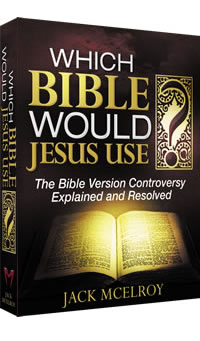The Last Words of Christ

From "Answers To Your Bible Version Questions" ©2003 by David W. Daniels
Reproduced by permission
Question: Why do the four gospels attribute three different sentences to Christ as his last? On the same note, Matthew and Mark say that the last words of Christ were, in Hebrew, "Eloi, Eloi, lama sabachthani?" This has traditionally been translated as, "My God, My God, why hast thou forsaken me?" However, a more accurate translation would be, "My El, My El, why has thou forsaken me?" El is the name of a specific pagan god. Why would Jesus call out to a pagan god at the moment of his death?
Answer:
The Last Words of Christ
"The Last Words of Christ" weren't all spoken at one time. They were spoken between 9 am (the 3rd hour of the day, 6 am being the "first hour") and 3 pm (the "ninth hour").
But the "last words" you listed aren't His last. Look carefully. I have the four Gospels here. It is the moments before the Lord Jesus "gave up the ghost" that He died:
Matthew:
27:50 Jesus, when he had cried again with a loud voice, yielded up the ghost.
Mark:
15:37 And Jesus cried with a loud voice, and gave up the ghost.
Luke:
23:46 And when Jesus had cried with a loud voice, he said, Father, into thy hands I commend my spirit: and having said thus, he gave up the ghost.
John:
19:30 When Jesus therefore had received the vinegar, he said, It is finished: and he bowed his head, and gave up the ghost.
If there is any real issue, it's not in the words spoken over six hours; it's over the words spoken in the last moments of His earthly life. If you notice, Matthew, Mark and Luke all three say that Jesus "cried with a loud voice"
Luke and John both have words Jesus said before he "gave up the ghost." Two sets of them:
"It is finished" and "Father, into thy hands I commend my spirit"
Logically, I can figure which came after which.
First the Lord Jesus said, "It is finished." I have no problem believing that is what He "cried with a loud voice." Can you hear it?
"IT IS FINISHED!!!!"
Then "Father, into thy hands I commend my spirit." He said this to indicate He was GIVING UP His life. Then the Scripture is understood when it says in all four gospels, "he gave up the ghost" (Greek, ekpneo, to breath out one's last breath, breathe out one's life).
So there is no conflict; the four gospels are complementary. Each complements the others to give a full picture.
"Eli, Eli, lama sabachthani?"
This is a statement that has precedent. It is a quote of Psalm 22:1, which begins:
Psalms 22:1 "My God, my God, why hast thou forsaken me? why art thou so far from helping me, and from the words of my roaring?"
The psalm goes on to describe a lot of things that were fulfilled that day on the cross:
Psalms 22:14 "I am poured out like water, and all my bones are out of joint: my heart is like wax; it is melted in the midst of my bowels." This describes what happens during crucifixion.Psalms 22:16 "For dogs have compassed me: the assembly of the wicked have inclosed me: they pierced my hands and my feet." Again, this is what happened to the Lord Jesus Christ that day (Luke 24:40; John 20:20, 25).
Psalms 22:18 "They part my garments among them, and cast lots upon my vesture." This again was fulfilled that day, by the soldiers near the cross (witnessed in all four gospels: Matthew 27:35; Mark 15:24; Luke 23:34; John 19:24).
And a wonderful point, that God actually had not rejected His Son is revealed in this psalm:
Psalms 22:23-24 "Ye that fear the LORD, praise him; all ye the seed of Jacob, glorify him; and fear him, all ye the seed of Israel. For he hath not despised nor abhorred the affliction of the afflicted; neither hath he hid his face from him; but when he cried unto him, he heard."
"El" was not the name used, in the sense of a pagan deity. "El" was used instead as the name of God. It is found 235 times in the Hebrew Old Testament. Out of those 235 times, 212 times "El" clearly means the one God.
- See more articles on related topics:
- Bible Versions
More on Bible Versions:
Products of interest:
-

Answers to Your Bible Version Questions
224 pages
David W. Daniels answers difficult questions about the KJV. Learn how to defend the KJV and why you can trust it. -

Look What's Missing!
256 pages
For years, publishers have been removing words, and even whole verses, from modern Bibles. What's missing from your Bible? Take a look! -

Which Bible Would Jesus Use?
342 pages
Everyone's got an opinion as to which Bible is best. If Jesus walked into your church, which Bible would He quote from? -

Is The "World's Oldest Bible" a Fake?
352 pages
Here is proof that the Sinaiticus, a supposedly ancient Bible text on which modern Bibles are based, is actually a 19th-century fake.
